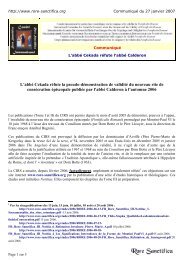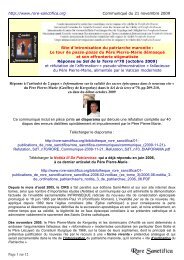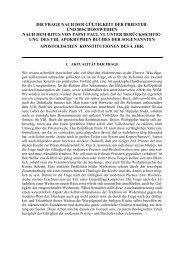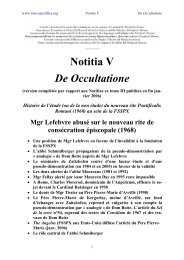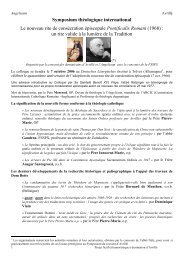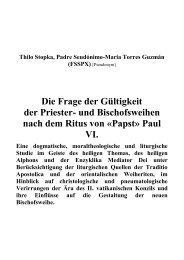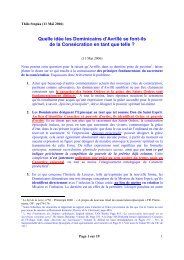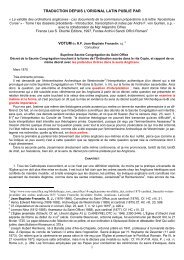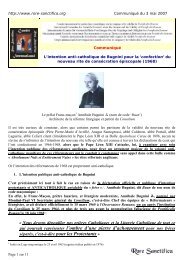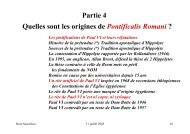The 1928 Book of Common Prayer, The Standard ... - Rore Sanctifica
The 1928 Book of Common Prayer, The Standard ... - Rore Sanctifica
The 1928 Book of Common Prayer, The Standard ... - Rore Sanctifica
Create successful ePaper yourself
Turn your PDF publications into a flip-book with our unique Google optimized e-Paper software.
Articles <strong>of</strong> Religion<br />
arise again, and amend our lives. And therefore they are to be condemned, which<br />
say, they can no more sin as long as they live here, or deny the place <strong>of</strong><br />
forgiveness to such as truly repent.<br />
XVII. Of Predestination and Election<br />
Predestination to Life is the everlasting purpose <strong>of</strong> God, whereby (before the<br />
foundations <strong>of</strong> the world were laid) he hath constantly decreed by his counsel<br />
secret to us, to deliver from curse and damnation those whom he hath chosen in<br />
Christ out <strong>of</strong> mankind, and to bring them by Christ to ever-lasting salvation, as<br />
vessels made to honour. Wherefore, they which be endued with so excellent a<br />
benefit <strong>of</strong> God, be called according to God’s purpose by his Spirit working in<br />
due season: they through Grace obey the calling: they be justified freely: they<br />
be made sons <strong>of</strong> God by adoption: they be made like the image <strong>of</strong> his onlybegotten<br />
Son Jesus Christ: they walk religiously in good works, and at length, by<br />
God’s mercy, they attain to everlasting felicity.<br />
As the godly consideration <strong>of</strong> Predestination, and our Election in Christ, is<br />
full <strong>of</strong> sweet, pleasant, and unspeakable comfort to godly persons, and such as<br />
feel in themselves the working <strong>of</strong> the Spirit <strong>of</strong> Christ, mortifying the works <strong>of</strong> the<br />
flesh, and their earthly members, and drawing up their mind to high and<br />
heavenly things, as well because it doth greatly establish and confirm their faith<br />
<strong>of</strong> eternal Salvation to be enjoyed through Christ, as because it doth fervently<br />
kindle their love towards God: So, for curious and carnal persons, lacking the<br />
Spirit <strong>of</strong> Christ, to have continually before their eyes the sentence <strong>of</strong> God’s<br />
Predestination, is a most dangerous downfall, whereby the Devil doth thrust<br />
them either into desperation, or into wrethchlessness <strong>of</strong> most unclean living, no<br />
less perilous than desperation.<br />
Furthermore, we must receive God’s promises in such wise, as they be<br />
generally set forth to us in Holy Scripture: and, in our doings, that Will <strong>of</strong> God<br />
is to be followed, which we have expressly declared unto us in the word <strong>of</strong> God.<br />
XVIII. Of obtaining eternal Salvation only by the Name <strong>of</strong> Christ.<br />
<strong>The</strong>y also are to be had accursed that presume to say, That every man shall be<br />
saved by the Law or Sect which he pr<strong>of</strong>esseth, so that he be diligent to frame his<br />
life according to that Law, and the light <strong>of</strong> Nature. For Holy Scripture doth set<br />
out unto us only the Name <strong>of</strong> Jesus Christ, whereby men must be saved.<br />
XIX. Of the Church.<br />
<strong>The</strong> visible Church <strong>of</strong> Christ is a congregation <strong>of</strong> faithful men, in which the pure<br />
Word <strong>of</strong> God is preached, and the Sacraments be duly ministered according to<br />
Christ’s ordinance, in all those things that <strong>of</strong> necessity are requisite to the same.<br />
As the Church <strong>of</strong> Jerusalem, Alexandria, and Antioch, have erred; so also the<br />
Church <strong>of</strong> Rome hath erred, not only in their living and manner <strong>of</strong> Ceremonies,<br />
but also in matters <strong>of</strong> Faith.<br />
Articles <strong>of</strong> Religion<br />
XX. Of the Authority <strong>of</strong> the Church.<br />
<strong>The</strong> Church hath power to decree Rites or Ceremonies, and authority in Controversies<br />
<strong>of</strong> Faith: and yet it is not lawful for the Church to ordain anything that<br />
is contrary to God’s Word written, neither may it so expound one place <strong>of</strong><br />
Scripture, that it be repugnant to another. Wherefore, although the Church be<br />
a witness and a keeper <strong>of</strong> Holy Writ, yet, as it ought not to decree any thing<br />
against the same, so besides the same ought not to enforce any thing to be<br />
believed for necessity <strong>of</strong> Salvation.<br />
XXI. Of the Authority <strong>of</strong> General Councils.<br />
[<strong>The</strong> Twenty-first <strong>of</strong> the former Articles is omitted; because it is partly <strong>of</strong> a local<br />
and civil nature, and is provided for, as to the remaining parts <strong>of</strong> it, in other<br />
Articles.]<br />
XXII. Of Purgatory.<br />
<strong>The</strong> Romish Doctrine concerning Purgatory, Pardons, Worshipping and Adoration,<br />
as well <strong>of</strong> Images as <strong>of</strong> Relics, and also Invocation <strong>of</strong> Saints, is a fond<br />
thing, vainly invented, and grounded upon no warranty <strong>of</strong> Scripture, but rather<br />
repugnant to the Word <strong>of</strong> God.<br />
XXIII. Of Ministering in the Congregation<br />
It is not lawful for any man to take upon him the <strong>of</strong>fice <strong>of</strong> public preaching, or<br />
ministering the Sacraments in the Congregation, before he be lawfully called,<br />
and sent to execute the same. And those we ought to judge lawfully called and<br />
sent, which be chosen and called to this work by men who have public authority<br />
given unto them in the Congregation, to call and send Ministers into the Lord’s<br />
vineyard.<br />
XXIV. Of Speaking in the Congregation in such a Tongue as the people<br />
understandeth.<br />
It is a thing plainly repugnant to the Word <strong>of</strong> God, and the custom <strong>of</strong> the<br />
Primitive Church, to have public <strong>Prayer</strong> in the Church, or to minister the<br />
Sacraments, in a tongue not understanded <strong>of</strong> the people.<br />
XXV. Of the Sacraments.<br />
Sacraments ordained <strong>of</strong> Christ be not only badges or tokens <strong>of</strong> Christian men’s<br />
pr<strong>of</strong>ession, but rather they be certain sure witnesses, and effectual signs <strong>of</strong> grace,<br />
and God’s good will towards us, by the which he doth work invisibly in us, and<br />
doth not only quicken, but also strengthen and confirm our Faith in him.<br />
<strong>The</strong>re are two Sacraments ordained <strong>of</strong> Christ our Lord in the Gospel, that<br />
is to say, Baptism, and the Supper <strong>of</strong> the Lord.<br />
Those five commonly called Sacraments, that is to say, Confirmation, Penance,<br />
Orders, Matrimony, and Extreme Unction, are not to be counted for Sacraments<br />
<strong>of</strong> the Gospel, being such as have grown partly <strong>of</strong> the corrupt following<br />
<strong>of</strong> the Apostles, partly are states <strong>of</strong> life allowed in the Scriptures; but yet have not<br />
like nature <strong>of</strong> Sacraments with Baptism, and the Lord’s Supper, for that they<br />
have not any visible sign or ceremony ordained <strong>of</strong> God.



